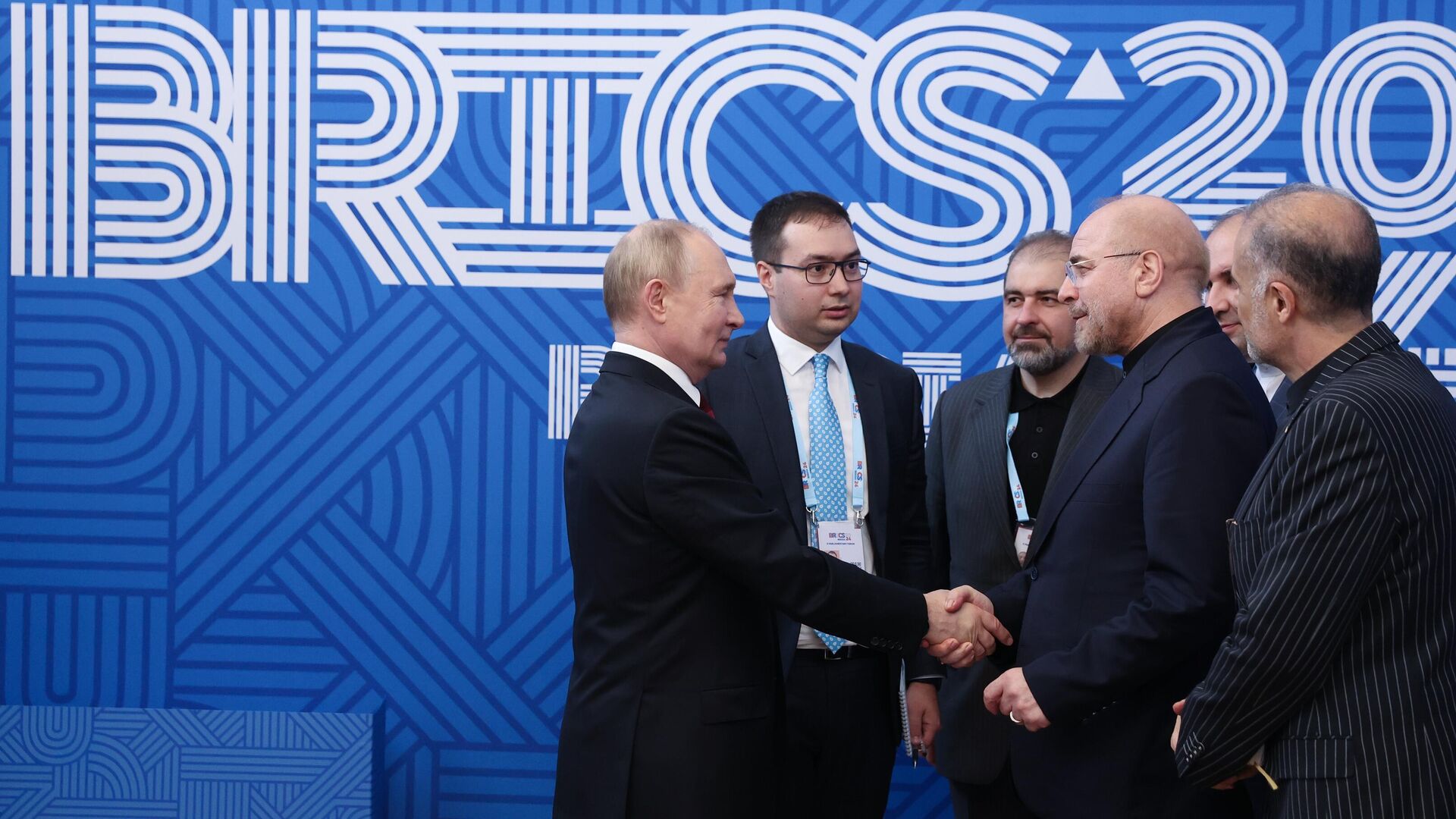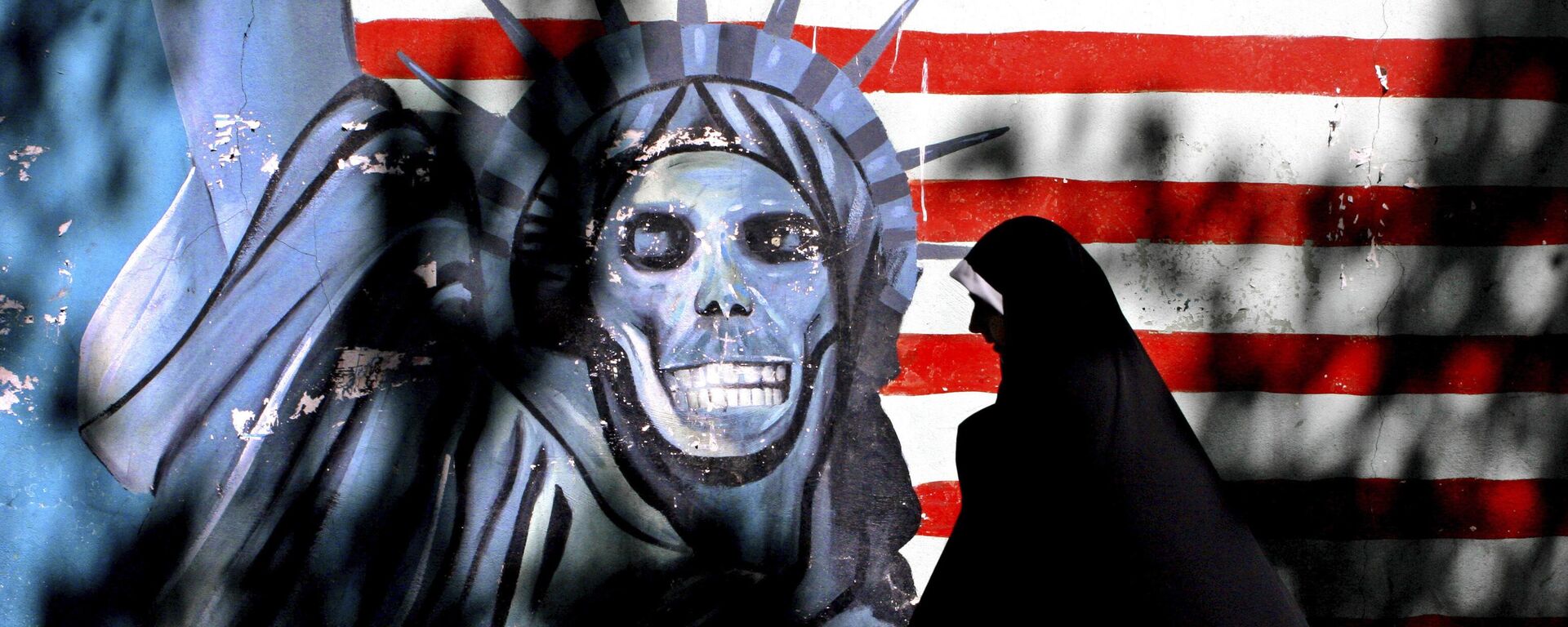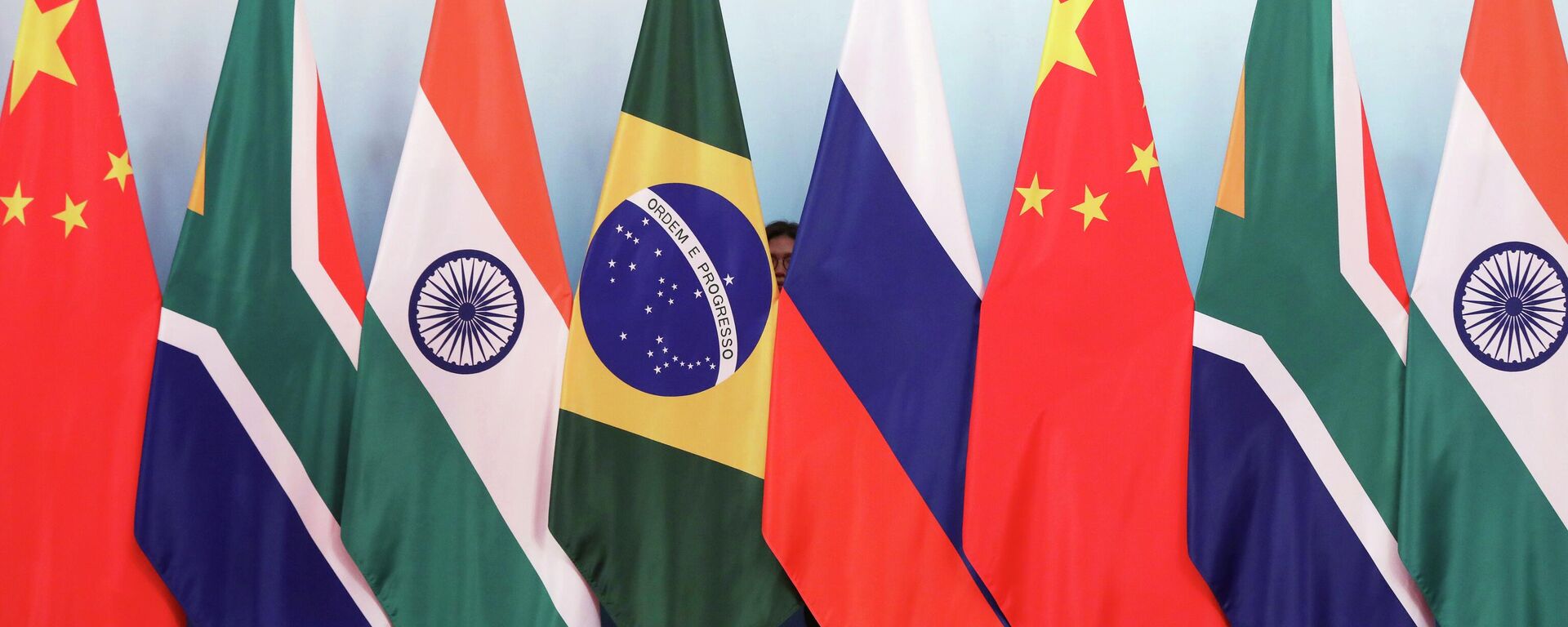https://sputnikglobe.com/20240717/brics-should-be-radical-revolutionary-step-to-oust-west-oriented-international-order---expert-1119399296.html
BRICS Should Be Radical Revolutionary Step to Oust West Oriented International Order - Expert
BRICS Should Be Radical Revolutionary Step to Oust West Oriented International Order - Expert
Sputnik International
Speaking to Sputnik, Pramod Rai, Research Fellow at the Centre for Central Eurasian Studies, Mumbai University and Assistant Professor of Political Science at Raja Rammohun Roy Mahavidyalata, Hooghly, West Bengal, shared his views on the building new world order, future of Eurasian cooperation and the new multilateral-multipolar global order.
2024-07-17T12:29+0000
2024-07-17T12:29+0000
2024-07-17T12:29+0000
world
russia
china
brics
west
world order
multipolar world
https://cdn1.img.sputnikglobe.com/img/07e8/07/0c/1119348376_0:117:3223:1930_1920x0_80_0_0_8719e30ff80d481e7595b8e532cd5b81.jpg
"BRICS+ in 2024 unites 45% of the earth’s land, 46% of the global population, approximately 46% of the global GDP, not less than 25% of global trade, 32% of the world output of natural gas, 43% of crude reserves, and 38% global petroleum imports. BRICS as an Organization is on an evolutionary processes of building new world order through, which is of course inclusive and without confrontation. There’s debate going on that BRICS should be a radical revolutionary step to oust the present West oriented international order. In my view, although the BRICS has been emerging as a trusted Organization, where the desire for its membership is growing, especially from the countries of global south; it still has to do much to demonstrate its full capabilities and rationality. Of course, the biggest challenge for the BRICS is not to follow or become the typical western model and mechanisms in its functioning. Not only expanding through numbers, but showing the pragmatism and getting results should be the highest goal at the present juncture. When we go through the lengthy joint declaration of BRICS, since 2009, we would get the visions, which is inclusive and avoids any confrontation with any party itself manifests, why this body should be global importance. But as the government and leaders keeps changing, there foreign policy priorities have been changed. I think, irrespective of party and leaders, the importance of BRICS would stay on the upper part, which simply can’t be avoided," Pramod Rai said. According to him, the future of Eurasian cooperation would indeed massively contribute to the nature of the new multilateral-multipolar world order. Russia is an indispensable state and an influential power of the region, which of course it should be for it's greater geo-economic and geo-political interests, he added. Since China has already activated its commercial programs and policies there, India should also accelerate its moves in the region, the expert concluded."Recently, I was an attendee of BRICS Futurological Forum at Russian state University for Humanities at Moscow, where I had much interesting talks with the Iranian attendees. Our opinions and concerns are the same, although INSTC was introduced and initiated to ease and increase trade connectivity between the major cities of commercially hubs like Mumbai, Moscow, Bandar Abbas, Tehran, Astrakhan etc. Because the lack of easy and accessible trading routes have been a major hurdle for the countries like India, Iran and Central Asian Republics. But the expected result and pragmatism to get it is yet away. Countries like Iran, India, Russia and CARs should be taking the vision and mission of the INSTC to more speedy and fruitful ways. When we see Russia- India relations termed as “special and privileged strategic” partnership” the only missing part is the absence of vibrant economic exchanges between these trusted partners. Chennai-Vladivostok Maritime Corridor, would a game changer to expand the Indo-Russia bilateral trade on another level. This sea route covers approximately 5,600 nautical miles(10,300 km). As India’s energy imports from the Gulf basically comes via sea route, the proposed Chennai-Vladivostok Maritime Corridor will surely filled commercial gap between Russia and India," the scholar said.
https://sputnikglobe.com/20240707/american-exceptionalism-us-foreign-policy-advisors-urge-resumption-of-nuclear-testing-1119265604.html
https://sputnikglobe.com/20240621/brics-association-of-cities-and-municipalities-unites-over-18000-members-1119048911.html
https://sputnikglobe.com/20240711/brics-futurological-forum-challenges-western-paradigm-of-history--1119338608.html
russia
china
west
Sputnik International
feedback@sputniknews.com
+74956456601
MIA „Rossiya Segodnya“
2024
Sputnik International
feedback@sputniknews.com
+74956456601
MIA „Rossiya Segodnya“
News
en_EN
Sputnik International
feedback@sputniknews.com
+74956456601
MIA „Rossiya Segodnya“
Sputnik International
feedback@sputniknews.com
+74956456601
MIA „Rossiya Segodnya“
future of eurasian cooperation, the new multilateral-multipolar global order, brics
future of eurasian cooperation, the new multilateral-multipolar global order, brics
BRICS Should Be Radical Revolutionary Step to Oust West Oriented International Order - Expert
Speaking to Sputnik, Pramod Rai, Research Fellow at the Centre for Central Eurasian Studies, Mumbai University and Assistant Professor of Political Science at Raja Rammohun Roy Mahavidyalata, Hooghly, West Bengal, shared his views on the building new world order, future of Eurasian cooperation and the new multilateral-multipolar global order.
"BRICS+ in 2024 unites 45% of the earth’s land, 46% of the global population, approximately 46% of the global GDP, not less than 25% of global trade, 32% of the world output of natural gas, 43% of crude reserves, and 38% global petroleum imports. BRICS as an Organization is on an evolutionary processes of building new world order through, which is of course inclusive and without confrontation. There’s debate going on that BRICS should be a radical revolutionary step to oust the present West oriented international order. In my view, although the BRICS has been emerging as a trusted Organization, where the desire for its membership is growing, especially from the countries of global south; it still has to do much to demonstrate its full capabilities and rationality. Of course, the
biggest challenge for the BRICS is not to follow or become the typical western model and mechanisms in its functioning. Not only expanding through numbers, but showing the pragmatism and getting results should be the highest goal at the present juncture. When we go through the lengthy joint declaration of BRICS, since 2009, we would get the visions, which is inclusive and avoids any confrontation with any party itself manifests, why this body should be global importance. But as the government and leaders keeps changing, there foreign policy priorities have been changed. I think, irrespective of party and leaders, the importance of BRICS would stay on the upper part, which simply can’t be avoided," Pramod Rai said.
According to him, the future of Eurasian cooperation would indeed massively contribute to the nature of the new multilateral-multipolar world order. Russia is an indispensable state and an influential power of the region, which of course it should be for it's greater geo-economic and geo-political interests, he added. Since China has already activated its commercial programs and policies there, India should also accelerate its moves in the region, the expert concluded.
"But of course, the main stakeholder countries of the Eurasian landmass should have a clear vision about the coming global order. Although the criticality of the west still stays, the Eurasian future is majorly depends on the countries like Russia, India and China. Whatever moves, they make would make a profound impact on the region and for the coming post-west international order," Pramod Rai said.
"Recently, I was an attendee of BRICS Futurological Forum at Russian state University for Humanities at Moscow, where I had much interesting talks with the Iranian attendees. Our opinions and concerns are the same, although INSTC was introduced and initiated to ease and increase trade connectivity between the major cities of commercially hubs like Mumbai, Moscow, Bandar Abbas, Tehran, Astrakhan etc. Because the lack of easy and accessible trading routes have been a major hurdle for the countries like India, Iran and Central Asian Republics. But the expected result and pragmatism to get it is yet away. Countries like Iran, India, Russia and CARs should be taking the vision and mission of the INSTC to more speedy and fruitful ways. When we see Russia- India relations termed as “special and privileged strategic” partnership” the only missing part is the absence of vibrant economic exchanges between these trusted partners. Chennai-Vladivostok Maritime Corridor, would a game changer to expand the Indo-Russia bilateral trade on another level. This sea route covers approximately 5,600 nautical miles(10,300 km). As India’s energy imports from the Gulf basically comes via sea route, the proposed Chennai-Vladivostok Maritime Corridor will surely filled commercial gap between Russia and India," the scholar said.





